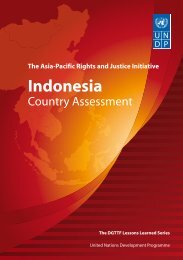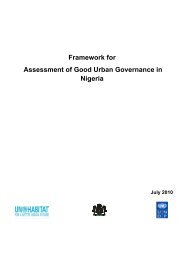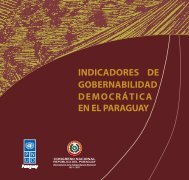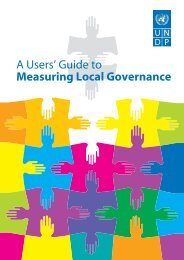English - UNDP
English - UNDP
English - UNDP
Create successful ePaper yourself
Turn your PDF publications into a flip-book with our unique Google optimized e-Paper software.
Lessons<br />
learned and<br />
recommendations<br />
Citizen Report Cards have limited impact<br />
in the centralized decision making system<br />
The development of tailor-made citizen report cards as an<br />
alternative and innovative tool to monitor access to, and quality<br />
of, basic public services in Tajikistan was a key achievement of<br />
the DGTTF. Initial activities showed for the first time how people<br />
perceived services and service providers.<br />
The citizen report cards method is currently the responsibility of<br />
the Centre for Strategic Research. Progress in its implementation<br />
is noticeable – it has spread to all districts – and it is becoming<br />
an attractive tool for monitoring changes based on citizens’<br />
perception.<br />
However, the Tajikistan experience suggests that the real impact<br />
of citizen report cards is limited by centralized planning and<br />
decision-making. There is little evidence to suggest that local<br />
authorities directly concerned with the results of the citizen<br />
report cards are able to bring about change and invest in<br />
service improvement.<br />
Therefore, in order to ensure that citizen report cards improve<br />
performance, they should be part of a broader decentralization<br />
process. That should strengthen downward and upward<br />
accountability within governance structures 30 .<br />
Successful data-collection systems require<br />
national leadership and ownership<br />
The DGTTF projects supported improvement of the government’s<br />
information systems for planning, monitoring, and evaluation<br />
of public policy. This included strengthening the capacities of<br />
regional and district authorities in data collection. This new<br />
approach enabled the alignment of collected data from district<br />
and regional levels with national level indicators (primarily,<br />
indicators related to the national MDG targets, and National<br />
Development and Poverty Reduction Strategy targets).<br />
The project’s results established a basis for improving governance<br />
practices, especially in evidence-based policy and decisionmaking,<br />
and in monitoring and evaluation of public policies.<br />
Unfortunately, this was utilized only to a limited degree, as<br />
Tajikistan remains heavily centralized and the collected data<br />
and information are not publicly available.<br />
Therefore, development of a data collection system and a<br />
sound mechanism for monitoring and evaluating public policies<br />
have to be implemented in parallel with other activities aimed<br />
at improving the transparency and accountability of public<br />
institutions.<br />
The involvement of the National Office for Statistics is needed<br />
to ensure that the data collection methods and monitoring<br />
and evaluation are properly integrated into the overall system<br />
of statistics and reporting at all levels.<br />
Engagement of all key stakeholders in<br />
preparation of Methodology for district<br />
development planning was crucial<br />
The training provided through the DGTTF project support during<br />
the preparation of district development plans strengthened the<br />
abilities of the district development councils to embark on the<br />
planning process. The inclusion of district council members in<br />
training activities proved beneficial for their understanding of<br />
the potential role of mid-term planning in local development<br />
processes.<br />
Engaging regional and national authorities proved crucial for the<br />
success of the project, as it ensured that the critical views and<br />
comments from the national and regional decision makers were<br />
reflected. The proposed methodology was adopted as a standard<br />
participatory planning approach compatible with the overall<br />
system of planning and budgeting in Tajikistan. In this way, the<br />
DGTTF project introduced an innovative and unique practice<br />
in Tajikistan that differed from other similar district planning<br />
initiatives. Currently, the Ministry of Economic Development<br />
and Trade and the Ministry of Finance, in partnership with <strong>UNDP</strong>,<br />
provide technical support to district development committees<br />
in formulating their plans.<br />
30<br />
<strong>UNDP</strong> (2010): Fostering Social Accountability: from Principle to Practice. A Guidance<br />
Note. Page 9.<br />
23




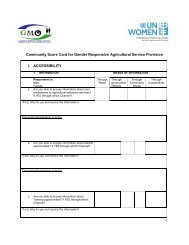

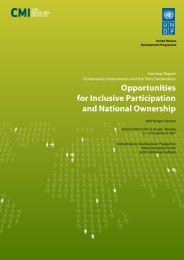
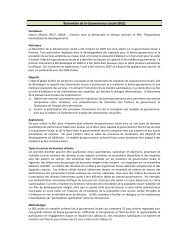
![GuÃa del Usuario ] - Governance Assessment Portal](https://img.yumpu.com/44740603/1/190x253/gua-a-del-usuario-governance-assessment-portal.jpg?quality=85)
